Literature Reviews and Review Research
Literature reviews can be a part of a research proposal, an introduction to an article, or a stand-alone research project. As discussed in the post Designing Review Research, numerous types of publishable studies are based on prior knowledge including systematic reviews, meta-syntheses, meta–analyses, and integrative literature reviews. Here are some open-access examples of each type from SAGE Journals. Look at the methods used for each one, including search strategy, inclusion criteria, number of sources selected, and approaches for organizing and analyzing the studies.
Systematic Reviews
Bliersbach, H. Future citizens between interest and ability: A systematic literature review of the naturalization and crimmigration scholarship. Ethnicities, 0(0), 14687968221143771. https://doi.org/10.1177/14687968221143771
Abstract. The determinants of whether or not an immigrant seeks to become a citizen are still largely invisible to scholars; as are the decisions made during the naturalization process by street-level bureaucrats. Research on the acquisition of citizenship has incorporated a number of determinants of naturalization outcomes over the past decades, but lacks the contextualization of immigration law in its relation to criminal law. This systematic literature review of the 140 most-cited papers across the naturalization and crimmigration literatures seeks to construct a theoretical bridge between the disciplines in an effort to illuminate the blind spots challenging naturalization scholarship. I argue that the inclusion of crimmigration as a factor impacting naturalization is essential for scholarship in order to accurately use citizenship policies as an indicator of a state’s overall approach to immigration - particularly regarding residence requirements. The conceptual utilization of crimmigration in the context of citizenship acquisition offers new insights into the underexplored relationship between citizenship policy and the individual migrant, potentially uncovering some of the factors hindering immigrants’ ability to seek formal membership. Evidence within recent crimmigration scholarship points towards the role played by racialization within the functioning of a crimmigration system. This paper reviews the prominent streams of both strands of literature first utilizing a bibliometric analysis of the respective citation networks and second, diving into the substantial developments and parallels in naturalization and crimmigration research.direction.
Senekal, J. S., Ruth Groenewald, G., Wolfaardt, L., Jansen, C., & Williams, K. Social media and adolescent psychosocial development: a systematic review. South African Journal of Psychology, 0(0), 00812463221119302. https://doi.org/10.1177/00812463221119302
Abstract. Adolescents are noted to increasingly utilise social media for communication, and therefore, social media is where much of their psychosocial development takes place. The potential impact of social media on psychosocial development is complex and is an emerging field of research. A systematic review was conducted to investigate existing research relating to social media’s effects on psychosocial development. Good practice in systematic review reporting was followed, aligned to the Preferred Reporting Items for Systematic Reviews and Meta-Analyses statement, and a team of five reviewers were involved in each stage of the review process to enhance objectivity and methodological rigour. The review included 20 studies, published between 2008 and 2019. The findings show a complex relationship between social media and adolescent psychosocial development. Social media was found to involve potential risks, in terms of excessive and problematic use, comparison, and cyberbullying. Social support, from both peers and parents, may buffer these negative impacts. Potential benefits of social media use include supporting identity development and the maintenance of existing peer relationships. Considering the growth of social media use, it is imperative to consider the development and provision of interventions and mental health care services to address the potential risks associated with increased social media use. Psychoeducation with adolescents and parents as to the risks, benefits, and constructive parental supervision of social media is also recommended. The review highlights the need for high-quality empirical research to further clarify the long-term impact of social media use, particularly within the South African context.
Stedje, K., Kvamme, T. K., Johansson, K., Stensæth, K. A., Odell-Miller, H., Bukowska, A., Tamplin, J., Wosch, T., & Baker, F. A. (2023). Influential factors of spousal relationship quality in couples living with dementia – A narrative synthesis systematic review. Dementia, 22(1), 281-302. https://doi.org/10.1177/14713012221137280
Abstract. The aim of this systematic review is to identify factors that influence relationship quality in couples living with dementia. Previous research has shown how maintaining a positive spousal relationship quality is important for quality of life and coping for both the caregiver and the person with dementia. Knowledge of influential factors could contribute to a deeper understanding of the value of a couple-centred clinical practice and research, within the field of dementia.
Systematic procedures to database search, screening, data extraction and synthesis were followed. Qualitative, quantitative and mixed methods studies were included. A narrative synthesis was conducted through narrative summaries of included studies, thematic analysis and narrative descriptions of factors influencing relationship quality.
Meta-syntheses
Hulley, J., Bailey, L., Kirkman, G., Gibbs, G. R., Gomersall, T., Latif, A., & Jones, A. Intimate Partner Violence and Barriers to Help-Seeking Among Black, Asian, Minority Ethnic and Immigrant Women: A Qualitative Metasynthesis of Global Research. Trauma, Violence, & Abuse, 0(0), 15248380211050590. https://doi.org/10.1177/15248380211050590
Abstract. It is well known that victims of intimate partner violence experience numerous barriers to leaving abusive relationships. For ethnic minority and immigrant women these barriers are significantly exacerbated. This metasynthesis explored barriers to help-seeking as experienced by Black, Asian, minority ethnic and immigrant women with experience of intimate partner violence. A review of worldwide literature published in English in peer-reviewed journals on this topic from 2000 to July 2020 produced 2597 relevant articles. After removing duplicates and applying the exclusion criteria, a total of 47 articles were selected for inclusion in the review. The synthesis found that these women faced additional barriers as a result of institutional racism, immigration laws, culture and religion, and issues of cultural competence, and lack of diversity within frontline services. Such barriers, from a range of formal and informal resources, services and other mechanisms of support, served to exacerbate feelings of fear, threat, isolation and powerlessness. The barriers were also further weaponised by perpetrators in order to extend their reign of terror and control. As a result, women were caught in a double-bind – stay in an abusive relationship or face further threats and consequences if they attempted to leave. Whilst our search criteria focused on barriers to help-seeking, many of the papers included in our synthesis also explored facilitators to help-seeking, which are included in our findings and overwhelmingly relate to informal support from females.
Moore, I., Morgan, G., Welham, A., & Russell, G. (2022). The intersection of autism and gender in the negotiation of identity: A systematic review and metasynthesis. Feminism & Psychology, 32(4), 421-442. https://doi.org/10.1177/09593535221074806
Abstract. Influenced by theories of intersectionality, performativity and gender hegemony, this review sought to explore the intersection of autism and gender in qualitative research into autistic identity. Twelve papers were subjected to a thematic metasynthesis following a systematic search. Study participants were predominantly cisgender female or gender-diverse: perspectives of cisgender autistic males were lacking. The three superordinate themes developed related to: (1) the ways in which autism discourses restricted gender identities, through the influence of the “extreme male brain” and “masking” narratives and the use of autism to explain gender non-conformity and gender diversity; (2) the ways in which gendered autistic identities were positioned within social power hierarchies as “othered”, subordinate and less acceptable ways of being; and (3) possibilities for finding spaces of belonging and resistance. While autism as an identity may offer community and freedom from normative expectations, dominant autism discourses act to restrict and police gender, reinforcing existing power hierarchies. We encourage practitioners to reflect on the clinical, ethical and political implications of their positioning in relation to the constructs of “autism” and “gender”, and to explore alongside people seeking support the personal and political impacts of gendered autism discourses.
Westerlund, H., Kallio, A. A., & Karlsen, S. (2022). Interrogating intercultural competence through a “pedagogy of interruption”: A metasynthesis of intercultural outreach projects in music teacher education. Research Studies in Music Education, 44(2), 380-398. https://doi.org/10.1177/1321103x211026007
Abstract. Highlighting the need for teacher education programs to respond to rapidly diversifying societies, this article reports a qualitative metasynthesis of intercultural outreach projects in music teacher education, conceptualizing these projects as a “pedagogy of interruption.” Results show that such outreach projects interrupt the individualistic frame of music teacher education, the known difference, the logic of teaching, and the understanding of what intercultural teacher competence is, rather moving toward letting the context teach. The complex relational work involved in intercultural outreach projects can be seen to establish spaces for framing learning within professional self-reflexivity, embracing uncertainty and trusting relational becomings through an investment in the political and moral aspects of teacher education and intercultural theorization. The article argues that intercultural outreach projects and theorization can be taken as a healthy test for contemporary music teacher education to rethink what competence and its own education is for in the 21st Century.
Meta–analyses
Behnke, M., Pietruch, M., Chwiłkowska, P., Wessel, E., Kaczmarek, L. D., Assink, M., & Gross, J. J. (2022). The Undoing Effect of Positive Emotions: A Meta-Analytic Review. Emotion Review, 15(1), 45-62. https://doi.org/10.1177/17540739221104457
Abstract. The undoing hypothesis proposes that positive emotions serve to undo sympathetic arousal related to negative emotions and stress. However, a recent qualitative review challenged the undoing effect by presenting conflicting results. To address this issue quantitatively, we conducted a meta-analytic review of 16 studies (N = 1,220; 72 effect sizes) measuring sympathetic recovery during elicited positive emotions and neutral conditions. Findings indicated that in most cases, positive emotions did not speed sympathetic recovery compared to neutral conditions. However, when a composite index of cardiovascular reactivity was used, undoing effects were evident. Our findings suggest the need for further work on the functions of positive emotions. Advocates of functional perspectives on emotion have long struggled to say what functions positive emotions might serve, if any. Whereas it seems easy to specify candidate functions for negative emotions such as fear, disgust, or anger, it has seemed less obvious what functions positive emotions might serve. One promising candidate was offered by Levenson (1988) when he suggested that positive emotions might serve to "undo" negative emotions by facilitating recovery from the high-activation states often associated with negative emotion. Since this undoing hypothesis was first proposed, dozens of studies have sought to test this hypothesis, but findings to date have been mixed (Cavanagh & Larkin, 2018). In the present review, we employ a meta-analytic technique to quantitatively synthesize the literature on the undoing effect of positive emotions, examining the relationship between positive emotions and autonomic nervous system (ANS) recovery from negative emotions and stress.
Hsiao, T.-Y., & Tseng, W.-T. (2022). A Meta-Analysis of Test-Retest Reliability in Language Anxiety Research: Is Language Anxiety Stable or Variable? SAGE Open, 12(4), 21582440221134619. https://doi.org/10.1177/21582440221134619
Abstract. Researchers have agreed that language anxiety is situation-specific; however, whether existing instruments measure stable or transient components of this anxiety remains controversial. Therefore, this study examined language anxiety’s trait stability and state variability. The results from synthesizing 21 test-retest correlations based on existing scales showed a large effect (r = .82). Meta-regression and subgroup analyses revealed that the aggregated correlation varied with target languages, but not with age, measuring scales, or retest intervals. The overall results provide evidence that situation-specific language anxiety, as measured by existing scales, is as stable as broad personality traits are, but it is not a personality trait. This finding suggests a need to develop anxiety instruments for transient state language anxiety that will complement rather than replace existing scales that are capable of measuring the temporal stability of language anxiety. This finding also provides implications for language research and practice with regard to anxiety, and for research on other individual-difference variables and their measurement.
Koops-Geuze, G. J., & Weerman, F. M. Community sanctions in youth justice compared to other youth crime responses: A meta-analysis. European Journal of Criminology, 0(0), 14773708211035305. https://doi.org/10.1177/14773708211035305
Abstract. This meta-analysis examines the official recidivism effects of two types of community sanctions in youth justice, namely community service and behavioural intervention programmes. Two analyses were conducted: a comparison between the effects of community sanctions and custodial sanctions, versus a comparison between the effects of community sanctions and dismissals. Following a systematic literature search, data extraction and analysis, mean effect sizes were calculated utilizing (log) odds ratio as the main effect measure. To explore heterogeneity, a meta-regression was conducted with four moderator variables: methodological rigour, referral stage, main focus of sanction and sample risk level. The hypotheses were that recidivism would be significantly lower for delinquent youth subject to community sanctions compared with those subject to custodial sanctions, but that differences in recidivism between delinquent youth subject to community sanctions versus dismissals would be insignificant. In total, 23 studies were deemed eligible for inclusion (Ncust = 7, Ndism = 16). Final results were in favour of the hypotheses, namely, significantly lower recidivism rates for community sanctions compared with custodial sanctions, and no significant differences for community sanctions compared with dismissals. For both comparisons, the 95% confidence interval indicated the effects varied from just below zero to substantially in favour of community sanctions. Finally, moderator analysis revealed that studies of lower methodological quality and mixed referral stages were more likely to report larger effect sizes.
Integrative Literature Reviews
Aguinis, H., Ramani, R. S., & Alabduljader, N. (2023). Best-Practice Recommendations for Producers, Evaluators, and Users of Methodological Literature Reviews. Organizational Research Methods, 26(1), 46-76. https://doi.org/10.1177/1094428120943281
Abstract. We categorized and content-analyzed 168 methodological literature reviews published in 42 management and applied psychology journals. First, our categorization uncovered that the majority of published reviews (i.e., 85.10%) belong in three categories (i.e., critical, narrative, and descriptive reviews), which points to opportunities and promising directions for additional types of methodological literature reviews in the future (e.g., meta-analytic and umbrella reviews). Second, our content analysis uncovered implicit features of published methodological literature reviews. Based on the results of our content analysis, we created a checklist of actionable recommendations regarding 10 components to include to enhance a methodological literature review’s thoroughness, clarity, and ultimately, usefulness. Third, we describe choices and judgment calls in published reviews and provide detailed explications of exemplars that illustrate how those choices and judgment calls can be made explicit. Overall, our article offers recommendations that are useful for three methodological literature review stakeholder groups: producers (i.e., potential authors), evaluators (i.e., journal editors and reviewers), and users (i.e., substantive researchers interested in learning about a particular methodological issue and individuals tasked with training the next generation of scholars).
Christmals, C. D., Gross, J., Aziato, L., & Armstrong, S. J. (2018). The State of Nursing Research in Ghana: An Integrative Literature Review. SAGE Open Nursing, 4, 2377960818783820. https://doi.org/10.1177/2377960818783820
Abstract. For nursing practice to be responsive to the needs of patients, it must be driven by contextual research evidence. To guide institutional and national nursing research policy, there is need to determine the quantity and quality of nursing research in Ghana. The purpose of this integrative literature review was to quantify, critically evaluate, and describe nursing research publication in Ghana from January 2007 to December 2016 with regard to the country's research capacity to sustain evidence-based practice.
Kelpšienė, I., Armakauskaitė, D., Denisenko, V., Kirtiklis, K., Laužikas, R., Stonytė, R., Murinienė, L., & Dallas, C. Difficult heritage on social network sites: An integrative review. New Media & Society, 0(0), 14614448221122186. https://doi.org/10.1177/14614448221122186
Abstract. Social network sites (SNS) have recently become an active ground for interactions on contested and dissonant heritage, on the heritage of excluded and subaltern groups, and on the heritage of collective traumatic past events. Situated at the intersection between heritage studies, memory studies, Holocaust studies, social media studies and digital heritage studies, a growing body of scholarly literature has been emerging in the past 10 years, addressing online communication practices on SNS. This study, an integrative review of a comprehensive corpus of 80 scholarly works about difficult heritage on SNS, identifies the profile of authors contributing to this emerging area of research, the increasing frequency of publication after 2017, the prevalence of qualitative research methods, the global geographic dispersion of heritage addressed, and the emergence of common themes and concepts derived mostly from the authors ‘home’ fields of memory studies, heritage studies and (digital) media studies.
Learn more!
Understanding and staying up to date with the literature in your field is one of the ongoing efforts of academic researchers. For those at the beginning stages of the process, the initial literature review can seem like a major undertaking. These SAGE books can help! Use the code MSPACEQ123 for a 20% discount, valid until March 31, 2023.

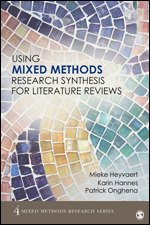
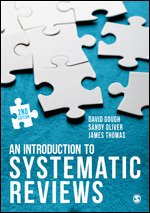
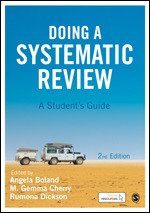
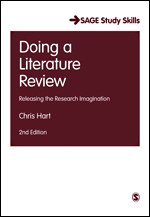


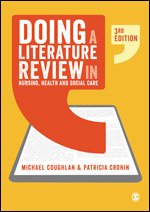
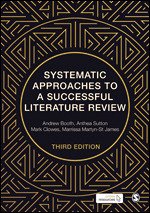
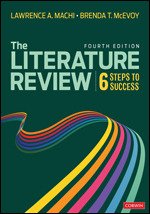
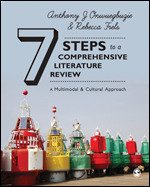











The process for researching literature on research methods is somewhat different from the process used for researching literature about the topic, problem, or questions. What should we keep in mind when selecting methods literature?